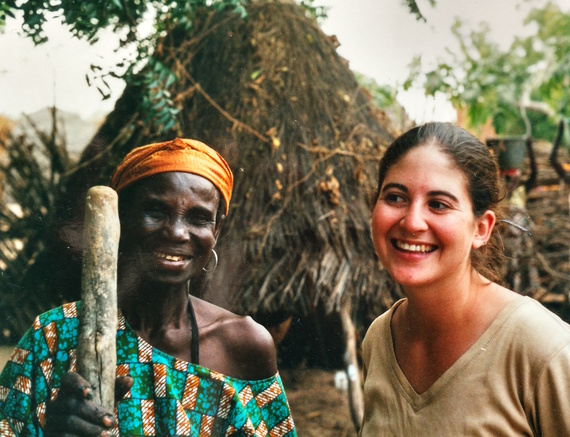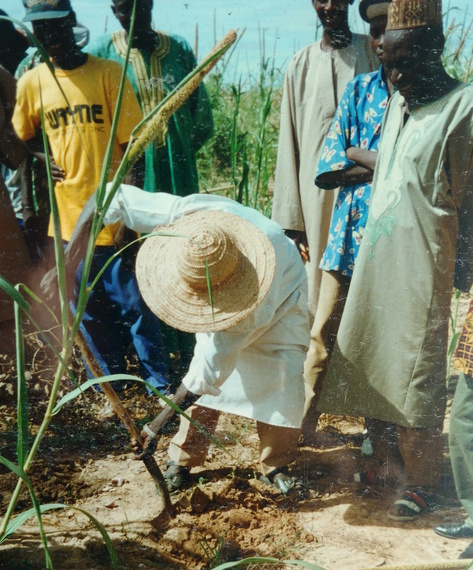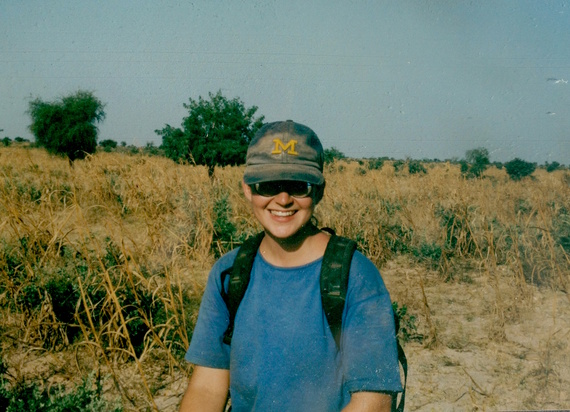The scents, emotions, and images of my Peace Corps experience remain crisp in my mind, even as the years sneak by. There’s a certain spice mixture – yazzi – I eat on eggs, greens and rice till this day, as long as my supply chain holds out. I remember long walks in the bush with friends, chatting about crops, insects and the inevitable village gossip. And I can still hear the sound of a distant motorcycle cutting through the desert air like a tiny persistent bee, signaling the imminent arrival of a friend and welcome diversion.
Many of those stories are best saved for the too-infrequent reunions with fellow volunteers, who will always know each other better than anyone else can. And who get how important and impactful these seemingly-small moments were during an often difficult time.
So today, and during this #PeaceCorpsWeek, I’m remembering some of the bigger things Peace Corps taught me, which have stayed with me through the years.
Relationships and community matter. Every conversation began with questions about one’s health, family and village. As trainees we spent endless hours practicing the greetings – mate ni kani, mate kwara borey – and they actually took us far once we were at site. We were taught to spend our first months, if not the first year, just talking with people. Because getting to know someone and their situation really matters. Speaking their language – literally and figuratively – matters. Everything is built on this. And in the darkest times, when I felt like my work was flailing and my language faltering, these conversations sustained me with the real understanding that as different as we may be, we can all connect around funny stories, or prices in the market, or the traffic. Now, years later, I still see how greeting people makes a huge difference. Even a smile and hello can be welcome, let alone some good old chit chat. They plant a human seed into our too-often rushed daily experience, and remind us how very similar we all are. Don’t forget to connect with people.
Food matters. The region and country I served in experienced tremendous rates of food insecurity, and food was always, always an issue. My formal role was to help farmers offset wind and water erosion, a monumental task in the face of the encroaching desert. In spite of our hopeful digging, tree planting and composting, in reality most families couldn’t grow enough millet or sorghum to survive the coming year. Almost all of the men left shortly after the harvest to find seasonal jobs on the coast, for example in the gold mines in Ghana. If they were lucky they came back with a bit of cash and some new clothes for the family. If they weren’t, they stayed abroad until they managed to eke out enough to bring home. Growing food was a challenge, and it was essential.
Women woke before dawn to pound millet, and tended great cauldrons of food over smoky fires much of the day. So cooking was also time to connect and learn. My friends were always happy to have me (attempt) to pound with them, or join in whatever shelling or shucking needed to get done for the next meal. I learned so much during these moments.
Sharing food was important, and often a time of celebration. From the standard offering of millet drink when you entered someone’s home, to popping corn and roasting crickets with kids during the harvest, to the ceremonial slaughtering of sheep and roasting of meat at holy days, food carried great significance. It’s so important and meaningful to eat together.
Indeed we all matter. I learned how incredibly privileged I am. I came from a modest background, but I had enjoyed incredible access to education, healthcare, food and my government in comparison to my peers in Niger. And what a roll of the dice it all was, for example, that I grew up going to a good school with the ability to travel in my youth, while a friend in my village grew up without access to formal education and was married by 16. I’ve never forgotten that.
At the same time I saw how incredibly different the experiences of women, children and the disabled can be, and how important it is to raise up all elements of the community, including my own.
I learned that everything we do matters, no matter who we are. The world can feel overwhelming, but even seemingly small acts like planting a garden, helping in a friend’s field, or building a fence, make a difference. That’s not to say I was some miraculous change-agent in my village; I learned more than I could ever offer. But standing up and doing things together had a huge impact on us all. We all have a shared responsibility to engage, to talk, to grow and to change things. We’re all citizens of this planet.
Sometimes I go for weeks or even months without actively thinking about my Peace Corps experience. But I’m sure not a day goes by when my commitments to building community, growing and sharing food, talking and changing things don’t guide me. I’m a work in progress as much as I was at 21. But these values give me direction no matter where my journey takes me. And for that, I thank the people I lived with and learned from in Ngamde, Niger. And I thank Peace Corps for giving me that opportunity.
— This feed and its contents are the property of The Huffington Post, and use is subject to our terms. It may be used for personal consumption, but may not be distributed on a website.
![]()
{$inline_image}
Source: Black Voices Huffington Post
Link: Make Time to Chat, Eat, Act: reflections this #PeaceCorpsWeek



